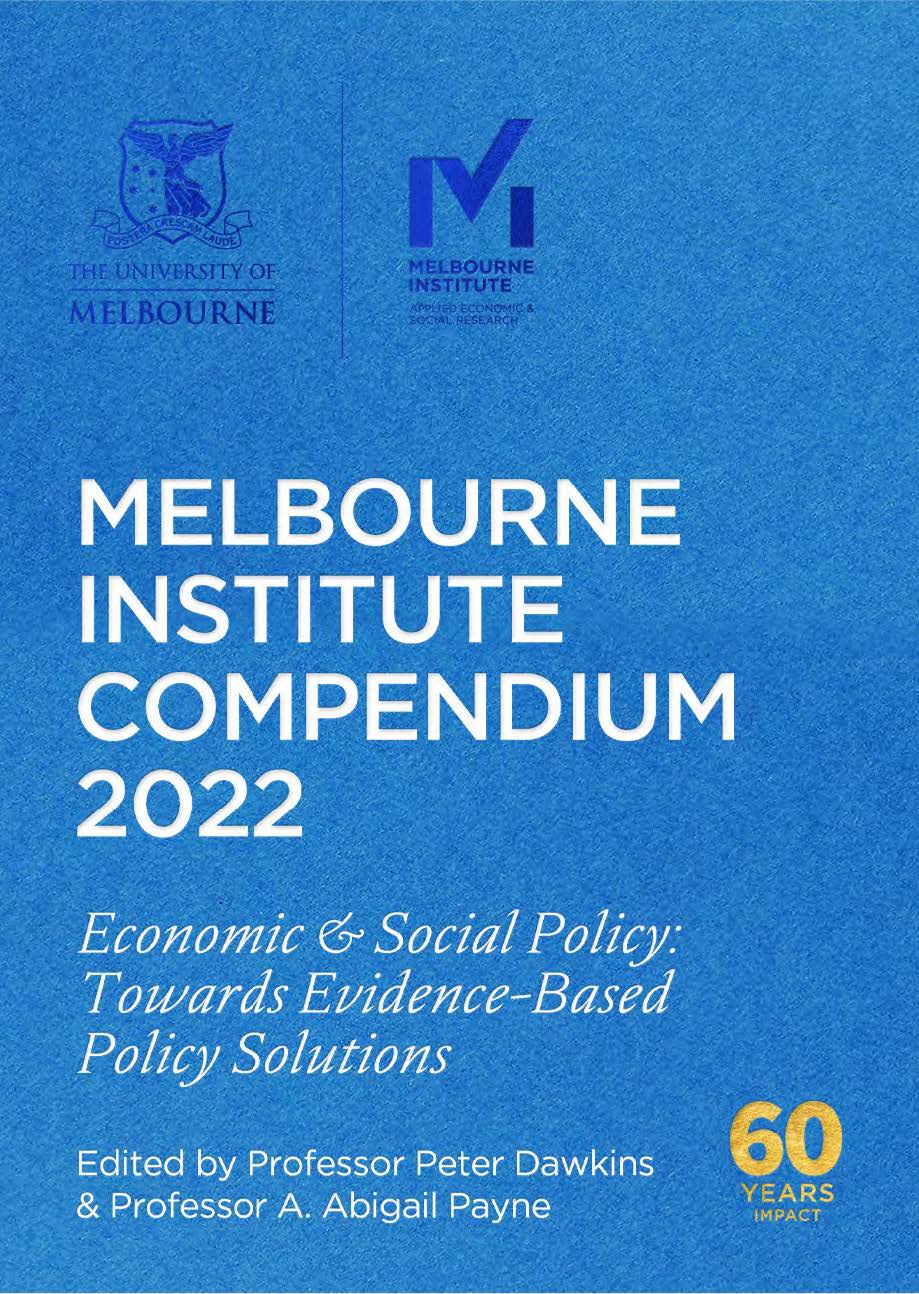Melbourne Institute Compendium 2022
To mark our 60th anniversary, we have produced this Compendium of papers on a range of contemporary issues, under the umbrella theme of evidence-based policy solutions in economic and social policy.

Economic & Social Policy: Towards Evidence-Based Policy Solutions
Edited by Professor Peter Dawkins, Emeritus Professor of Economics, Mitchell Institute, Victoria University, and former Director of the Melbourne Institute and Professor A. Abigail Payne, Director of the Melbourne Institute: Applied Economic & Social Policy and Ronald Henderson Professor.
The Melbourne Institute was founded in 1962 to undertake applied economic and social research into important public policy issues. Over its history the Institute has made important contributions to policy thinking on macroeconomic policy, poverty, wages, employment, unemployment, taxes and transfers, and health policy, amongst many other important policy areas. The Melbourne Institute also produces a range of regular economic indicators and survey data to contribute strongly to the economic and social policy infrastructure of Australia, such as the annual Household, Income and Labour Dynamics in Australia (HILDA) Survey, the Taking the Pulse of the Nation (TTPN) Survey, and the monthly Consumer Attitudes, Sentiments and Expectations in Australia (CASiE) Survey. The Melbourne Institute Data Lab (MIDL) also plays an instrumental role by providing a secure environment to access and analyse big data sets, to support the undertaking of field trials, and through the training of the next generation of data scientists who are developing skills through the lens of economic and social science.
To mark our 60th anniversary, we have produced this Compendium of papers on a range of contemporary issues, under the umbrella theme of evidence-based policy solutions in economic and social policy. We do not aim to be comprehensive or to cover all the big issues of the day. We cover a range of issues that reflect the range of expertise in the Melbourne Institute. In keeping with the tradition of the Melbourne Institute, we focus on the economic analysis of important social issues, such as employment, health care and education. In so doing we are sceptical of the idea that there is a trade-off between economic prosperity and social wellbeing. Rather, we see them as mutually reinforcing. Promoting economic prosperity helps to achieve social wellbeing. But, equally, promoting social wellbeing helps to provide the conditions for economic prosperity.
Please click the link below to read the Compendium.
Melbourne Institute Compendium 2022
Individual chapters:
Foreword by Paul Kelly
1. Towards evidence-based policy solutions in economic and social policy: An introduction by Professor Peter Dawkins & Professor A.Abigail Payne
2. Rising cost of living: Interest rate hikes and financial vulnerability by Professor Guay Lim, Associate Professor Viet Nguyen, Dr Tim Robinson & Associate Professor Sam Tsiaplias
3. Full employment, participation and productivity by Professor Peter Dawkins & Professor Ross Garnaut
4. Insecure employment: Do we really have a crisis? by Professor Mark Wooden
5. Equal tax for equal alcohol? Beverage types and antisocial and unlawful behaviours by Dr Ou Yang
6. Improving access to health care in Australia by Dr Susan Méndez, Professor Anthony Scott & Professor Yuting Zhang
7. Youth transitions after high school by Dr Steeve Marchand & Professor A. Abigail Payne
8. Maximising evidence-based policy analysis through data sharing by Professor A. Abigail Payne & Dr Rajeev Samarage
9. How much evidence is in Australia's evidence-based policy? The case of expanding early childhood education by Professor Marco Castillo & Professor Ragan Petrie
10. Coping strategies in the face of major life events: New insights into financial wellbeing in Australia by Dr Ferdi Botha & Professor John P. de New